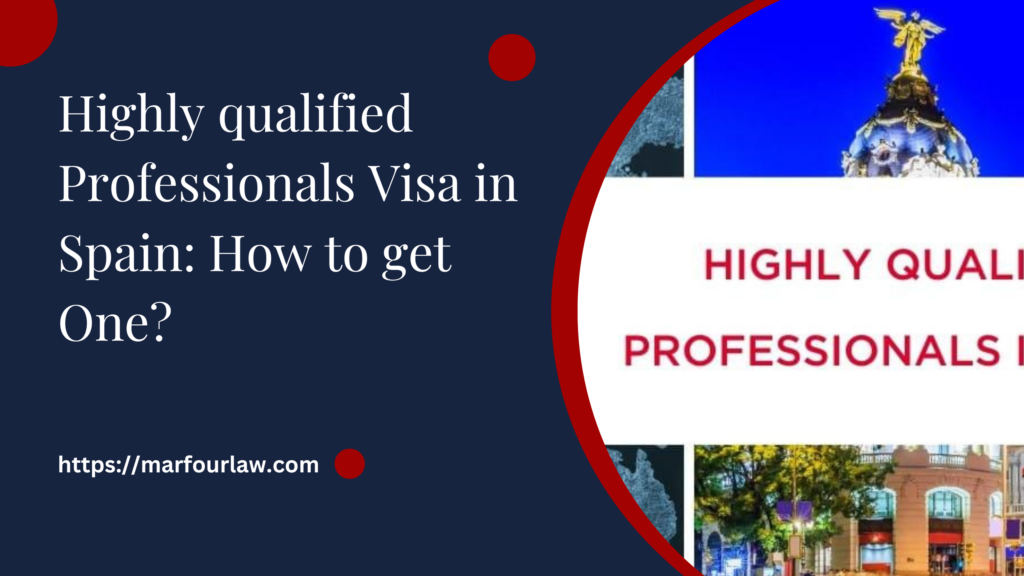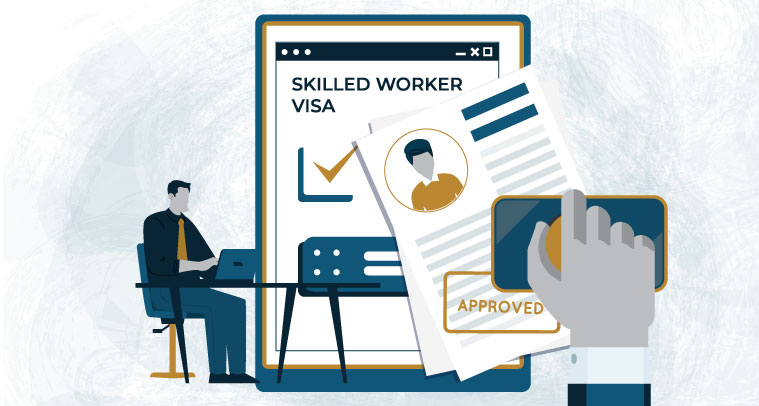Highly qualified Professionals Visa in Spain: How to get One?
Welcome to Spain, where highly qualified professionals are not only sought after but also the backbone of innovation and progress

Just like a visa grants access to a new country, these skilled individuals serve as the visa for progress and success in various industries. Whether it’s through the highly skilled worker Visa Spain, professional visa, or the Highly Skilled Professional Work Permit, these talented individuals bring a wealth of expertise and dedication to their fields. Join us as we explore the vibrant world of highly qualified professionals and discover how they’re shaping the landscape of Spain’s workforce.
Decoding the Highly qualified Professionals Visa
The Highly Qualified Professional Visa is a specialized work permit aimed at attracting highly skilled workers to Spain. This visa allows professionals with exceptional skills and qualifications to live and work in Spain, contributing significantly to the country’s economy and technological advancement.
The Legislative Landscape Explained
This section covers the legal framework and regulations governing the Highly Qualified Professional Visa in Spain. It includes:
- Eligibility Criteria: This section provides details about who can apply, such as the required qualifications, professional experience, and job offer specifics.
- Application Process: This section provides step-by-step guidance on how to apply for a visa, including where and when to submit applications and what forms and documents are needed.
- Required Documentation: A list of necessary documents, such as proof of qualifications, employment contracts, and background checks.
- Approval Process: Insights into how applications are reviewed, the timeline for approval, and any potential interviews or additional checks.
Understanding these legal aspects ensures that both applicants and employers are well-prepared to navigate the process efficiently.
Benefits Beyond Borders: What Makes It Unique?
This section highlights the distinct advantages of the Highly Qualified Professional Visa for highly skilled workers:
- Streamlined Application Procedures: A faster and more efficient application process compared to other visas.
- Family Reunification: The visa allows family members to join the primary applicant in Spain, making it an attractive option for those with families.
- Access to Labor Market: Immediate and broad access to Spain’s job market, allowing visa holders to work in their field without additional permits.
- Pathway to Residency: The potential for visa holders to eventually apply for long-term residency or citizenship in Spain.
- Attractive Work Environment: Information on the benefits of working in Spain, including the quality of life, healthcare, and educational opportunities.
These benefits make the visa appealing to highly skilled professionals considering a move to Spain.
Demystifying the EU Blue Card Comparison
This section compares the Highly Qualified Professional Visa with the EU Blue Card, which is another visa option for highly skilled workers in Europe:
- Eligibility Requirements: Comparison of the qualifications and job offer requirements for both visas.
- Application Process: Differences in the application procedures, timelines, and documentation needed.
- Benefits and Rights: Comparison of the rights and benefits provided by each visa, such as family reunification, labor market access, and social benefits.
- Validity and Renewal: Information on how long each visa is valid, the renewal process, and conditions for maintaining the visa.
- Geographical Mobility: Analysis of the mobility options within the EU for each visa, including the ability to move and work in different EU countries.
This comparison helps prospective applicants understand the pros and cons of each visa, aiding them in making an informed decision about which one best aligns with their professional and personal goals.
Pathway to Success: Requirements for the Highly Skilled Worker Visa
The Highly Skilled Worker Visa is designed to attract individuals with significant expertise and professional qualifications to Spain. This visa aims to ensure that only the most qualified professionals contribute to the Spanish workforce. Understanding the specific requirements and preparing a thorough application can significantly increase your chances of obtaining this visa.

Academic Credentials: Your Key to Entry
Your educational background is a fundamental component of your application for the Highly Skilled Worker Visa. Applicants must possess relevant academic qualifications, typically a bachelor’s degree or higher, in their field of expertise.
Additional professional certifications can also enhance your application by showcasing specialized skills. This requirement ensures that visa holders are well-educated and capable of performing high-level tasks in their respective professions.
Crafting Your Role: Aligning Tasks with Expertise
To qualify for the visa, the job you are applying for must align closely with your academic qualifications and professional experience. The role should clearly reflect your expertise and demonstrate your ability to perform specialized tasks.
Employers need to provide a detailed job description that highlights the specific skills and knowledge required for the position. This alignment is crucial in proving that you are an ideal candidate for the job and the visa.
Financial Thresholds: Understanding the Salary Requirement
Meeting the financial criteria is essential for the Highly Skilled Worker Visa. Minimum salary thresholds that applicants must meet or exceed vary depending on the industry and role.
These thresholds ensure that the positions offered to highly skilled workers justify the advanced level of expertise required. Providing evidence of your salary offer, such as a job contract, is necessary to demonstrate compliance with this requirement.
Public Sector and Educational Institutions: Special Considerations
Applications for positions within the public sector and educational institutions may have unique requirements or exemptions. For example, roles in academia or public health might prioritize different qualifications or have distinct procedural steps. Understanding these specific considerations is important for tailoring your application to meet all sector-specific criteria.
Consulting with your prospective employer or a visa specialist can help you navigate these unique requirements.
Essential Criteria for a Seamless Application
To ensure a smooth application process, it is important to meet all essential criteria. This includes submitting accurate and complete documentation, adhering to application deadlines, and complying with all visa regulations.
Required documents may include proof of qualifications, job offer details, salary confirmation, health insurance coverage, and evidence of no criminal record.
Thorough preparation and attention to detail will help ensure your application is successful, allowing you to bring your professional expertise to Spain.
Essential Documentation for the Highly Skilled Visa Application
“Essential Documentation for the Highly Skilled Visa Application” focuses on the necessary paperwork for applying for a visa for highly qualified workers.
This visa, known as the Highly Skilled Worker Visa or Highly Skilled Professional Work Permit, is commonly sought by professionals looking to work in Spain.
Proof of Qualifications and Experience
A primary requirement for the Highly Skilled Worker Visa in Spain is demonstrating your professional qualifications and experience. Necessary documents include:
- Academic certificates and diplomas.
- Professional licenses or certifications.
- A detailed CV or resume highlighting relevant work experience.
- Reference letters from previous employers.
Employment Contract or Job Offer
Applicants must provide a valid employment contract or formal job offer from a Spanish employer. This document should:
- Specify the job role and responsibilities.
- Detail the salary and working conditions, ensuring they meet the minimum standards set by Spanish labor laws.
- Include the duration of employment.
Proof of Financial Stability
To show that you can support yourself financially during your stay, you will need:
- Recent bank statements.
- Proof of income or savings.
- Financial guarantees from your employer, if applicable.
Valid Passport and Photographs
A valid passport is essential for the visa application. Ensure that:
- Your passport has at least six months of validity remaining.
- You provide recent passport-sized photographs that meet the specific requirements of the visa authorities.
Health Insurance
Having adequate health insurance coverage is mandatory. You will need to submit:
- Proof of private health insurance that covers you in Spain.
- Details of the insurance policy, including coverage limits and duration.
Criminal Record Certificate
Applicants must provide a criminal record certificate from their home country to prove they have no serious criminal convictions. This document should be:
- Recent (usually issued within the last three months).
- Translated into Spanish and, if necessary, legalized or apostilled.
Additional Supporting Documents
Depending on your specific situation, additional documents may be required, such as:
- Marriage or birth certificates for accompanying family members.
- Proof of residence, such as a rental contract or property deed in Spain.
- Any other documents requested by the Spanish immigration authorities.
Having these essential documents will help ensure a smooth application process for the Highly Skilled Professional Work Permit or Highly Skilled Worker Visa in Spain.
Step-by-Step Guide: Applying for the Highly Skilled Worker Visa
This section provides a detailed, step-by-step guide to help you apply for the Highly Skilled Worker Visa, ensuring you have all the information needed for a successful application.

Destination Details: Where and How to Submit Your Application
To apply for the Highly Skilled Worker Visa in Spain, follow these steps:
- Locate the Appropriate Consulate: Determine which Spanish consulate or embassy is responsible for processing visa applications in your region. You can find this information on the official website of the Spanish Ministry of Foreign Affairs.
- Gather Required Documents: Collect all necessary documents as outlined in the essential documentation section. Ensure they are complete and correctly translated if needed.
- Complete the Application Form: Fill out the visa application form accurately. Forms can usually be downloaded from the consulate’s website.
- Submit Your Application: Submit your application in person at the consulate or through an authorized visa application center. Some consulates offer online submission options.
- Pay Application Fees: Be prepared to pay the visa application fee, which can vary depending on the consulate and your nationality.
Family Matters: Including Dependents in Your Move
If you plan to bring family members with you, you’ll need to include them in your visa application process:
- Documentation for Dependents: Collect necessary documents for each family member, such as birth certificates, marriage certificates, and proof of relationship.
- Application Forms: Each dependent must have a completed application form. Some consulates might require separate appointments for each family member.
- Financial Proof: Provide evidence that you can financially support your dependents during their stay in Spain. This includes additional bank statements and proof of income.
- Health Insurance: Ensure that your health insurance covers your dependents or arrange separate policies for them.
Transitioning Smoothly: Relocating Within the Same Company
If you are relocating to Spain within the same company, the process can be more streamlined:
- Intra-Company Transfer Letter: Obtain a transfer letter from your current employer detailing your new position in Spain, the duration of the assignment, and how it fits within the company’s structure.
- Employment Contract: Ensure you have a valid employment contract for your new role in Spain that meets all necessary legal requirements.
- Corporate Support: Leverage any assistance your company offers for international relocations, such as help with visa applications, housing, and settling in Spain.
- Stay Informed: Keep up-to-date with any changes in immigration policies or requirements that might affect your transfer.
By following these steps, you can ensure a smooth and successful application process for the Highly Skilled Worker Visa, making your transition to Spain as seamless as possible.
Renewing Your Highly Qualified Visa: What You Need to Know
Renewing your Highly Qualified Visa is essential for maintaining your legal status and continued residence in your host country. Here’s what you need to know to navigate the renewal process smoothly.
Understanding Visa Validity and Renewal Periods
Visa validity periods can vary depending on your host country’s immigration laws and the type of visa you hold. It’s crucial to know your current visa’s expiration date and understand the renewal timeframe. Most countries require applicants to apply for renewal before their visa expires to avoid any disruptions to their residency status.
Required Documentation for Renewal
When renewing your Highly Qualified Visa, you will typically need to provide updated documentation to support your continued eligibility. This may include:
- Proof of Continued Employment: Submit documentation from your employer confirming your ongoing employment or engagement in the country.
- Updated Financial Information: Provide recent bank statements or other evidence of financial stability to demonstrate your ability to support yourself during the renewed visa period.
- Valid Passport: Ensure your passport has sufficient validity remaining beyond the renewal period.
- Health Insurance: Maintain adequate health insurance coverage and provide updated policy information.
- Criminal Record Certificate: Depending on the country’s requirements, you may need to provide a recent criminal record certificate.
- Any Additional Requirements: Be aware of any additional documentation or requirements specific to your host country or visa type.
Renewal Application Process
The renewal application process typically involves similar steps to the initial visa application:
- Application Submission: Submit your renewal application along with the required documentation to the appropriate immigration authorities or consulate.
- Application Fee: Be prepared to pay any applicable renewal fees as specified by the immigration authorities.
- Processing Time: Allow sufficient time for your renewal application to be processed. Processing times can vary depending on the country and the volume of applications.
- Notification of Decision: You will receive notification of the decision on your renewal application. If approved, you will be issued a renewed visa, allowing you to continue your stay in the country.
Seeking Professional Assistance
Navigating the visa renewal process can be complex, especially when dealing with highly qualified visa categories. Consider seeking assistance from immigration experts or legal professionals specializing in visa and residency matters.
They can guide the renewal requirements, help ensure your application is complete and accurate, and address any challenges that may arise during the process.
References for Further Information
For further information on renewing your Highly Qualified Visa, refer to official government resources, embassy or consulate websites, or consult with immigration lawyers specializing in visa renewal processes.
Staying informed and seeking professional advice can ensure a smooth and successful renewal process, allowing you to continue your residency and professional endeavors in your host country.
Navigating Job Changes: Managing Your Visa Transition
Transitioning between jobs while holding a visa adds an extra layer of complexity to the process. Here’s a guide to help you navigate this transition smoothly and effectively.

Understanding Visa Regulations
Before making any job changes, familiarize yourself with the visa regulations in your host country. Different visas may have specific requirements regarding employment, including restrictions on job changes, minimum salary thresholds, and notification procedures for changes in employment.
Assessing Visa Implications
Consider the potential implications of changing jobs on your visa status:
- Visa Validity: Check if your current visa allows for job changes and if there are any restrictions or limitations.
- Employer Sponsorship: Determine if your visa is tied to your current employer and, if so, whether your new employer is willing to sponsor it or if you need to apply for a new visa independently.
- Legal Requirements: Ensure that your new job meets all legal requirements for visa sponsorship, including salary thresholds and job classifications.
Communicating with Employers
Open communication with both your current and prospective employers is essential:
- Current Employer: Inform your current employer of your intention to leave and discuss any contractual obligations or notice periods.
- Prospective Employer: Clarify the visa sponsorship process with your prospective employer and ensure they understand any visa-related requirements or restrictions.
Visa Transition Options
Depending on your situation and visa regulations, you may have several options for managing your visa transition:
- Transfer of Sponsorship: If your new employer is willing to sponsor your visa, they may be able to facilitate a transfer of sponsorship from your current employer.
- Independent Application: If your visa is not tied to a specific employer, you may need to apply for a new visa independently based on your new job offer.
- Temporary Permissions: Some countries offer temporary permissions or grace periods for visa holders to transition between jobs without jeopardizing their legal status.
Seeking Legal Advice
Given the complexity of visa regulations and potential legal implications, consider seeking advice from immigration lawyers or professionals specializing in visa matters. They can provide personalized guidance based on your specific circumstances and help ensure compliance with visa regulations and employment laws.
References for Further Information
For further information on managing your visa transition during job changes, refer to official government resources, embassy or consulate websites, or consult with immigration lawyers specializing in visa and employment matters. Staying informed and seeking professional advice can minimize complications and ensure a smooth transition as you navigate changes in your employment and visa status.
Transitioning from Student to Professional: Your Visa Journey
Transitioning from a student visa to a professional visa marks a significant milestone in your career journey. Here’s a comprehensive guide to help you navigate this transition smoothly:
Understanding Visa Options
Before transitioning, familiarize yourself with the available visa options for professionals in your host country. Research visa categories tailored to highly skilled workers or professionals and determine the eligibility criteria for each.
Planning Ahead
Plan your transition well in advance to ensure a seamless process:
- Visa Requirements: Review the documentation and eligibility criteria for the professional visa you intend to apply for.
- Timeline: Determine the timing of your transition based on your graduation date, job search timeline, and visa processing times.
- Employment Prospects: Start exploring job opportunities aligned with your skills, qualifications, and career aspirations.
Leveraging Internships and Work Experience
Gain relevant work experience through internships, part-time jobs, or practical training opportunities during your studies. This experience can enhance your resume and increase your employability when transitioning to a professional visa.
Networking and Job Search
Utilize networking opportunities and career resources to secure employment:
- Professional Networks: Tap into alum networks, industry associations, and career fairs to connect with potential employers.
- Job Search Strategies: Tailor your resume, cover letters, and job applications to showcase your skills and qualifications effectively.
- Internship to Employment: If you’ve completed internships during your studies, explore the possibility of transitioning to full-time employment with the same employer.
Visa Application Process (Marfour)
Once you’ve secured a job offer, initiate the visa application process:
- Document Preparation: Gather the required documentation, including proof of employment, academic qualifications, financial stability, and health insurance coverage.
- Visa Application Submission: Submit your visa application along with the required documents to the appropriate immigration authorities or consulate.
- Application Fees: Be prepared to pay any applicable visa application fees.
- Follow-Up: Monitor the progress of your visa application and respond promptly to any requests for additional information.
Professional Development and Integration
Upon obtaining your professional visa, focus on integrating into the workforce and advancing your career:
- Continuous Learning: To stay competitive in your field, pursue opportunities for professional development, further education, and skills enhancement.
- Cultural Adaptation: Embrace the cultural nuances of your host country’s workplace environment and seek ways to contribute effectively to your organization.
Continue building professional relationships, seeking mentorship, and expanding your network within your industry.
Your Partner in Visa Success: Expert Assistance for Your Application
Navigating the visa application process can be complex and daunting. However, with expert assistance, you can increase your chances of a successful outcome. Here’s how professional support can be your invaluable ally in achieving visa success:

Understanding Visa Requirements
Professional assistance provides clarity on the intricate details of visa requirements. From documentation to eligibility criteria, experts ensure you have a comprehensive understanding of what is needed for a successful application.
Tailored Guidance
Every visa application is unique, and expert assistance tailors guidance to your specific circumstances. Whether it’s identifying the most suitable visa category or addressing potential challenges in your application, personalized support maximizes your chances of success.
Application Preparation
Preparing a visa application requires meticulous attention to detail. Professionals guide you through the process, helping gather necessary documents, completing application forms accurately, and ensuring compliance with all relevant regulations.
Legal Advice and Representation (Marfour)
Marfour is likely a placeholder or acronym representing legal advice and representation. In this context, it symbolizes the crucial role of legal experts in providing comprehensive assistance throughout the visa application process.
Legal professionals offer invaluable advice, address legal complexities, and effectively represent your interests, enhancing the overall success of your application.
Application Submission and Follow-Up
Once your application is ready, experts facilitate its submission and monitor its progress. They ensure all requirements are met, liaise with immigration authorities on your behalf, and respond promptly to any inquiries or requests for additional information.
Timely Updates and Communication
Professional assistance provides peace of mind through timely updates and clear communication. You stay informed about the status of your application, any changes in immigration policies or procedures, and receive guidance on next steps throughout the process.
Maximizing Success
By partnering with experts, you maximize your chances of visa success. Their experience, knowledge, and dedication streamline the application process, mitigate potential obstacles, and ultimately increase the likelihood of a positive outcome.
References for Further Information
For further information on obtaining expert assistance for your visa application, consider consulting reputable immigration law firms, visa consultancy services, or legal professionals specializing in immigration matters. Their expertise and guidance can significantly enhance your visa application experience and contribute to a successful outcome.
FAQs
Why should I seek professional assistance for my visa application?
Professional assistance ensures comprehensive guidance, tailored solutions, legal expertise, personalized support, timely updates, advocacy and representation, and peace of mind throughout the application process.
How can immigration experts help with my visa application?
Immigration experts offer guidance on requirements, assist with documentation, navigate complex procedures, provide legal expertise, offer personalized support, and act as advocates in case of complications.
Are immigration laws and regulations complex?
Yes, they can be intricate and subject to frequent changes. Immigration professionals possess up-to-date knowledge of relevant laws and policies to ensure compliance.
What if I encounter challenges with my visa application?
In case of complications, immigration professionals act as advocates, representing your interests and liaising with authorities to resolve issues and expedite the processing of your application.
Conclusion
Seeking professional assistance for your visa application can significantly enhance your chances of success and provide peace of mind throughout the process.
With comprehensive guidance, tailored solutions, legal expertise, personalized support, and advocacy, immigration experts serve as your invaluable partners in achieving your visa goals.
Whether you’re applying for a student visa, work permit, or residency, entrusting your case to experienced professionals ensures that your application is handled with care and diligence, leading to a smoother and more successful visa journey.
Experts in RESIDENCY PERMITS FOR HIGHLY QUALIFIED PROFESSIONALS IN SPAIN
Some important companies wishing to incorporate non-EU professionals as management staff or highly qualified professionals in Spain, as well as graduates or postgraduates from universities and prestigious business schools, have the possibility to do so. They can apply for a Spanish Residency Authorization on behalf of these highly qualified professionals.
This type of residency permit was approved by the Entrepreneurial Support Act of 27 September 2013 (Ley 14/2013).
The main advantages of this Spanish Residency and Work Permit is that the national employment rate is not considered, and the visa processing time is only 10 business days from the day the application is submitted and 20 days from when the Residency and Work Authorization is submitted.
obtained HIGHLY QUALIFIED PROFESSIONAL visas
assisted clients
%
satisfied clients
Customers worldwide
What are the main requirements?
Employee requirements:
- Be 18 years or older.
- Not have a criminal record where they have been living for the last 5 years.
- Have a university degree or equivalent professional experience of at least 3 years.
What are the main requirements for the company?
Only Spanish companies that meet one of the following criteria are eligible to apply for a Highly Qualified Professional (HQP) residency permit:
- Have more than 250 employees in the 3 months prior to applying.
- Have an annual net turnover of more than 50,000 euros.
- Have an annual net worth in Spain of more than 43,000 euros.
- Have annual investments from abroad of no less than 1,000 euros in the three years prior to the application.
- Have proof that they belong to a strategic sector, by means of a report from the Directorate-General for Trade and Investment.
- Have proof that the highly qualified hire will be part of a business project that is considered to be of public interest, by means of a report from the Directorate-General for Trade and Investment.
Who has to apply for this residency permit?
The company or the entity that wishes to hire the Highly Qualified Professional must apply for the Spanish Residence Permit.
The application can be submitted while the professional is in Spain (during their legal stay as a tourist) or while they are in their country.
In the latter case, the applicant needs to apply for a long-term visa once the residence permit has been guaranteed.
The validity of this permit is established according to the validity of the job contract, with a maximum of two years. This residence permit can be extended for another 2 years if the requirements have been fulfilled.
HOW LONG DOES IT TAKE FOR THE ADMINISTRATION TO RESPOND?
Decisions on Spanish Entrepreneur Visa applications will be made and notified by the Spanish consulate within 10 working days, while the Spanish Entrepreneur Residency authorizations will be made and notified by the Large Companies and Strategic Economic Sectors within a maximum of 20 days from the filing of the application.
Testimonials
![]()
![]()
MARFOUR IS READY TO HELP YOU WTH YOUR HQP RESIDENCY PERMIT IN SPAIN
Contact us, and Marfour International Law Firm will assist you in obtaining your Visa for Highly Qualified Professionals Residency and Work Authorization in Spain. One of our specialized English-speaking lawyers will contact you immediately. Do not hesitate to send us your enquiry.

